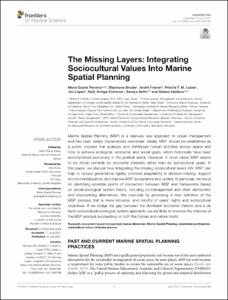| dc.contributor.author | Pennino, Maria Grazia | |
| dc.contributor.author | Brodie, Stephanie | |
| dc.contributor.author | Frainer, André | |
| dc.contributor.author | Lopes, Priscila F. M. | |
| dc.contributor.author | Lopez, Jon | |
| dc.contributor.author | Ortega-Cisneros, Kelly | |
| dc.contributor.author | Selim, Samiya | |
| dc.contributor.author | Vaidianu, Natasa | |
| dc.date.accessioned | 2021-10-15T18:45:48Z | |
| dc.date.available | 2021-10-15T18:45:48Z | |
| dc.date.issued | 2021 | |
| dc.identifier.citation | Pennino, M.G., Brodie, S., Frainer, A.,
Lopes, P.F.M., Lopez, J.,
Ortega-Cisneros, K., Selim, S. and
Vaidianu, N. (2021) The Missing
Layers: Integrating Sociocultural
Values Into Marine Spatial Planning.
Frontiers in Marine Science, 8:633198, 8pp. DOI 10.3389/fmars.2021.633198 | en_US |
| dc.identifier.uri | https://repository.oceanbestpractices.org/handle/11329/1742 | |
| dc.description.abstract | Marine Spatial Planning (MSP) is a relatively new approach to ocean management
and has been widely implemented worldwide. Ideally, MSP should be established as
a public process that analyzes and distributes human activities across space and
time to achieve ecological, economic and social goals, which historically have been
accomplished exclusively in the political arena. However, in most cases MSP seems
to be driven primarily by economic interests rather than by sociocultural goals. In
this paper, we discuss how integrating the missing sociocultural layers into MSP can
help to reduce governance rigidity, promote adaptability in decision-making, support
environmental justice, and improve MSP acceptance and uptake. In particular, we focus
on identifying possible points of connection between MSP and frameworks based
on social-ecological system theory, including co-management and other democratic
and empowering alternatives. We conclude by proposing a new definition of the
MSP process that is more inclusive, and mindful of users’ rights and sociocultural
objectives. If we bridge the gap between the dominant economic rhetoric and a de
facto sociocultural-ecological system approach, we are likely to improve the chances of
the MSP process succeeding on both the human and nature fronts. | en_US |
| dc.language.iso | en | en_US |
| dc.rights | Attribution 4.0 International | * |
| dc.rights.uri | http://creativecommons.org/licenses/by/4.0/ | * |
| dc.subject.other | Ecosystem based management | en_US |
| dc.subject.other | Marine spatial planning | en_US |
| dc.subject.other | Stakeholder participation | en_US |
| dc.subject.other | Sociocultural values | en_US |
| dc.title | The Missing Layers: Integrating Sociocultural Values Into Marine Spatial Planning. | en_US |
| dc.type | Journal Contribution | en_US |
| dc.description.refereed | Refereed | en_US |
| dc.format.pagerange | 8pp. | en_US |
| dc.identifier.doi | 10.3389/fmars.2021.633198 | |
| dc.subject.parameterDiscipline | Construction and structures | en_US |
| dc.subject.parameterDiscipline | Human activity | en_US |
| dc.bibliographicCitation.title | Frontiers in Marine Science | en_US |
| dc.bibliographicCitation.volume | 8 | en_US |
| dc.bibliographicCitation.issue | Article 633198 | en_US |
| dc.description.sdg | 14.5 | en_US |
| dc.description.eov | N/A | en_US |
| dc.description.methodologyType | Method | en_US |
| dc.description.methodologyType | Reports with methodological relevance | en_US |
| obps.contact.contactname | Maria Grazia Pennino | |
| obps.contact.contactemail | graziapennino@yahoo.it | |
| obps.resourceurl.publisher | https://www.frontiersin.org/articles/10.3389/fmars.2021.633198/full | |
 Repository of community practices in Ocean Research, Applications and Data/Information Management
Repository of community practices in Ocean Research, Applications and Data/Information Management

